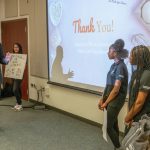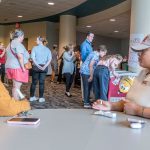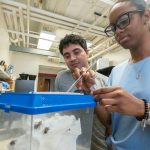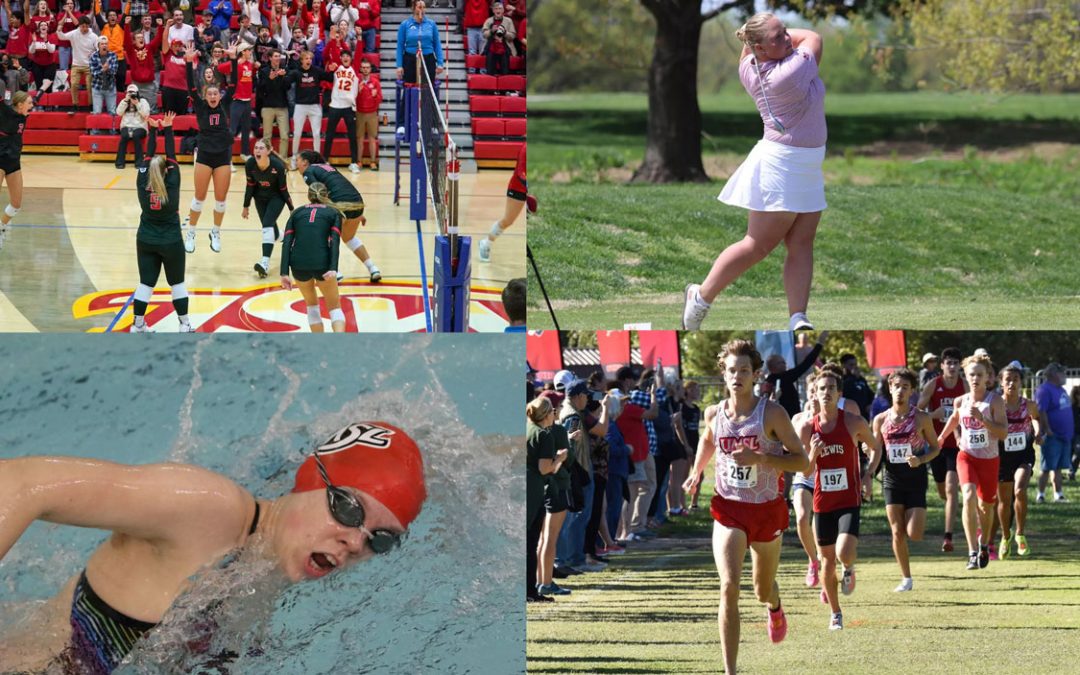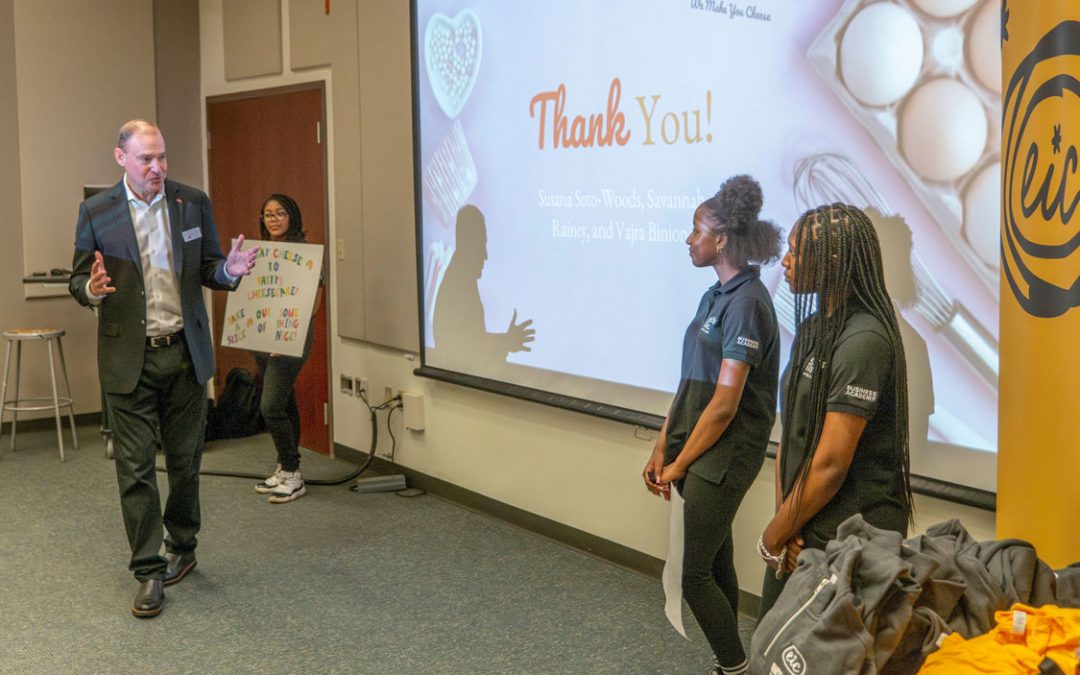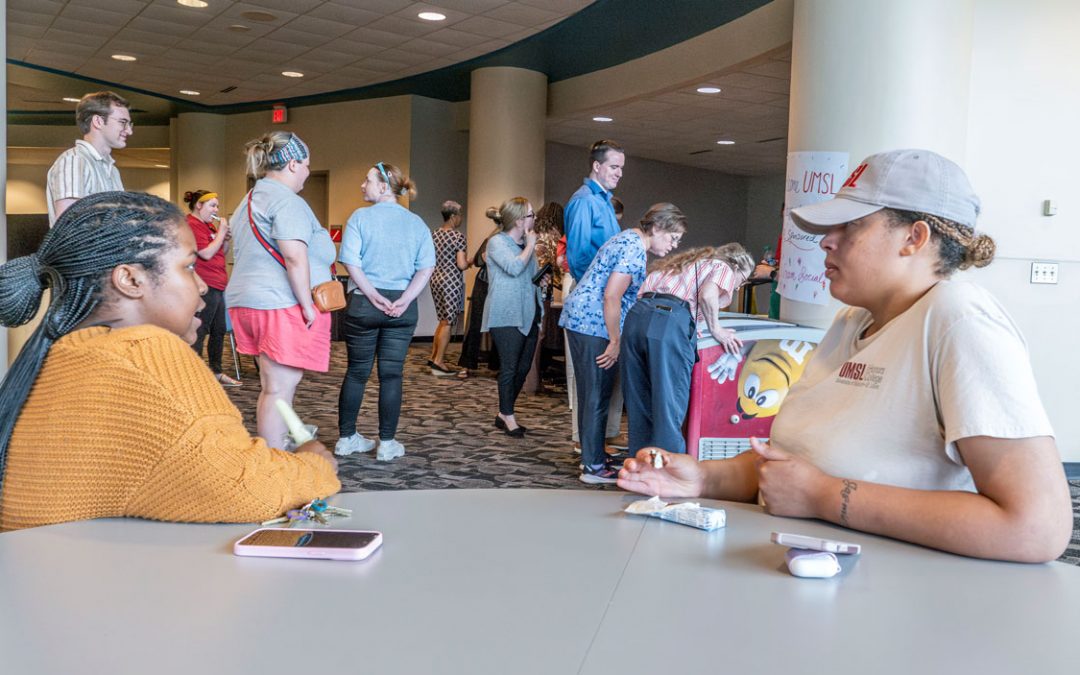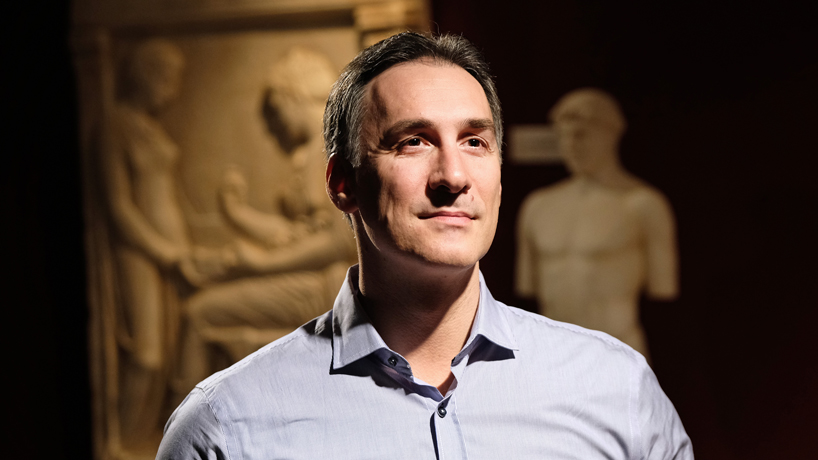
One of a handful of scholars selected to participate in the Greek Diaspora Fellowship Program, the visiting assistant professor of history studies those from his home country who came to the United States in the 19th and early 20th centuries. He’s pictured here in UMSL’s Nicholas and Theodora Matsakis Hellenic Cultural Center in Lucas Hall. (Photo by August Jennewein)
Twenty-one scholars are part of a new effort this year to avert Greece’s brain drain and develop strong collaborations between its universities and those in North America – and a University of Missouri–St. Louis faculty member is among them.
In his fifth year with UMSL’s Department of History, Nikolaos Poulopoulos first heard about the initiative last spring. A group of scholars at the Aristotle University of Thessaloniki reached out to him as a potential partner on the development of a new museum, and he was eager to help.
“It’s been a really interesting process,” says the Greek-born visiting assistant professor, who first came to the U.S. as an undergrad at the University of California at Berkeley. “I was picked by some people who I’ve never met before but who were familiar with my research.”
This winter, Poulopoulos, the scholars in Thessaloniki and another professor based at The Ohio State University learned that their shared project proposal was one of 12 selected for funding by the Greek Diaspora Fellowship Program. Now they’re all hard at work toward a future Museum of Greek Diaspora and Immigration that will be located in Thessaloniki, the country’s second-largest city.
“We’re going to be providing all the historical background and research and all the archival resources and exhibit materials, both for migration in and out of Greece,” explains Poulopoulos, who will spend two full months in Thessaloniki following the conclusion of UMSL’s spring semester.
In addition to the museum-specific contributions, Poulopoulos will help develop curricula, teach and mentor graduate students in his home country during his time as a fellow.
His area of academic expertise is one of several ranging from public health to chemical genomics research that the fellowship program has identified as pivotal to meet Greece’s needs.
“One of the major problems in Greece the last few years with the financial problems is that a lot of the people have fled the country – professors and researchers among them,” he says. “And so through the program I think they want to bring in some of the knowledge, the know-how that was acquired, and bring that back into the country.”
For his part, Poulopoulos is helping create a large database of “everything that’s available” and beginning to form a historical narrative as the team decides how to represent “this whole idea of diaspora and immigration.”
He notes that the museum’s location in Thessaloniki seems particularly appropriate, given that the city was home to one of the largest communities of Sephardic Jews beginning in the 15th century.
One part of the museum will be devoted to those five centuries of the history of Jewish Greeks, 95 percent of whom were transported to concentration camps during World War II.
“Another part will be about Greeks who migrated to the States, for example, and this is where I come in,” Poulopoulos says.” My main focus is 19th- and 20th-century Greek diaspora in the U.S. And I’m using the history of Greeks in St. Louis to highlight some of the major aspects of this early migration.”
During his time at UMSL, Poulopoulos has learned more and more about early Greek populations in the city. Greeks arrived earlier than many people realize, and St. Louis was also home to one of just four Greek consuls in the U.S. by the mid-1800s.
In addition, some of the first developers behind what is today the Delmar Loop were Greek.
“There was a famous Delmar Gardens multiplex of facilities, from vaudeville theater to the gardens and coffee shops and things like that,” Poulopoulos says. “It was kind of an early mall, and it was run by a Greek man in the 1890s.”
Those sorts of early contributions to St. Louis have inspired Poulopoulos to look more closely at the ways in which entertainment and “third places,” a term from postcolonial theory, have allowed Greek-Americans and others to negotiate identity in new cultural contexts.
“Your home is the first place, your work is the second place, but this is a place where you exchange ideas,” he says. “And you diminish this idea of not being a pure ethnic member of a society, because there were a lot of Italians and African Americans and Irish and all these people coming into these third spaces. So that allows this slow assimilation into the American culture to become a little smoother.”
These historical questions remain live, deeply relevant questions today, Poulopoulos adds.
“What is diaspora? And who is considered an immigrant?” he says. “This kind of contemporary discourse with respect to ethnicity, citizenship, immigration – it’s a very interesting and inspiring topic for a lot of scholars.”
As he disseminates his own research to a global audience this year, he’ll also be carrying UMSL’s name across the Atlantic and working among fellow scholars hailing from a cross section of the most prominent universities in the U.S. and Canada.
Managed by the Institute of International Education and the Fulbright Foundation in Greece with funding by the Stavros Niarchos Foundation, the fellowship program demonstrates a significant commitment to “expanding Greece’s human capital and investing in the country’s long-term economic recovery,” according to SNF officials.
“The Stavros Niarchos Foundation is thrilled both with the appeal and interest the program has generated among academics of the diaspora, as well as the wide-ranging expertise of the first round of fellows,” Stelios Vasilakis, director of programs and strategic initiatives at SNF, stated in a news release. “We look forward to these partnerships, which we believe will build long-lasting relationships and be beneficial to all parties involved.”
One benefit that Poulopoulos hopes to bring back to UMSL himself is an increased familiarity with technologies that could enrich his work with students here.
Through the fellowship, he’s already gleaning experience working with mapping technology such as GIS, and he anticipates a variety of meaningful applications in his UMSL courses that range from Greek history to local oral-history topics.
“We’re moving closer to this digital-humanities idea, where students are interested in how research can be carried into their own computers and how they can become more active contributors to what we call historiography,” Poulopoulos says. “As I become more versed in these technologies, hopefully I can bring those back to UMSL’s classrooms.”





